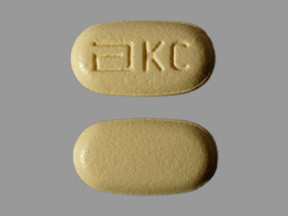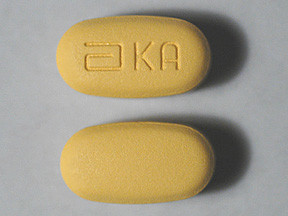LOPINAVIR/RITONAVIR - ORAL
PHONETIC PRONUNCIATION: (loe-PIN-a-vir/ri-TOE-na-vir)
COMMON BRAND NAME(S): Kaletra
GENERIC NAME(S): lopinavir/ritonavir
Uses
USES: This combination product contains two medications: lopinavir and ritonavir. This product is used with other HIV medications to help control HIV infection. It helps to decrease the amount of HIV in your body so your immune system can work better. This lowers your chance of getting HIV complications (such as new infections, cancer) and improves your quality of life. Both lopinavir and ritonavir belong to a class of drugs known as HIV protease inhibitors. Ritonavir increases ("boosts") the levels of lopinavir. This helps lopinavir work better. Lopinavir/ritonavir is not a cure for HIV infection. To decrease your risk of spreading HIV disease to others, do all of the following: (1) continue to take all HIV medications exactly as prescribed by your doctor, (2) always use an effective barrier method (latex or polyurethane condoms/dental dams) during all sexual activity, and (3) do not share personal items (such as needles/syringes, toothbrushes, and razors) that may have contacted blood or other body fluids. Consult your doctor or pharmacist for more details.
How to use LOPINAVIR/RITONAVIR - ORAL
HOW TO USE: Read the Medication Guide and, if available, the Patient Information Leaflet provided by your pharmacist before you start taking lopinavir/ritonavir and each time you get a refill. If you have any questions, ask your doctor or pharmacist. Take this medication by mouth with or without food as directed by your doctor, usually once or twice daily. Swallow the tablets whole. Do not crush, break or chew the tablets. The dosage is based on your medical condition, response to treatment, and other medications you may be taking. Be sure to tell your doctor and pharmacist about all the products you use (including prescription drugs, nonprescription drugs, and herbal products). For children, the dosage is also based on age, weight, and height. Once-daily dosing of this medication is not recommended for children younger than 18 years of age. If you are taking didanosine in addition to this product, you can take it at the same time as this product, but take them both without food. It is very important to continue taking this medication (and other HIV medications) exactly as prescribed by your doctor. Do not skip any doses. For the best effect, take this medication at evenly spaced times. To help you remember, take this medication at the same time(s) every day. Do not take more or less of this drug than prescribed or stop taking it (or other HIV medicines) even for a short time unless directed to do so by your doctor. Doing so may cause the amount of virus to increase, make the infection more difficult to treat (resistant), or worsen side effects.
Side Effects
Precautions
Interactions
Overdose
Images
Reviews
Faq for LOPINAVIR/RITONAVIR - ORAL
Lopinavir/ritonavir is a combination medication used to treat HIV (human immunodeficiency virus) infection. It belongs to a class of drugs called protease inhibitors.
Lopinavir/ritonavir works by inhibiting the protease enzyme, which is necessary for HIV replication and infection. By blocking this enzyme, it helps reduce the amount of HIV in the body and improve the immune system's function.
Common side effects of lopinavir/ritonavir include diarrhea, nausea, vomiting, abdominal pain, headache, dizziness, and tiredness. These side effects are usually mild and go away on their own.
Lopinavir/ritonavir is usually taken twice a day with food, as this helps improve its absorption and reduces stomach upset. It is important to take it regularly and at the same time each day to maintain its effectiveness.
It is generally advised to avoid or minimize alcohol consumption while taking lopinavir/ritonavir. Alcohol may increase the risk of liver toxicity and worsen side effects such as dizziness and drowsiness.
Lopinavir/ritonavir can interact with several other medications, including certain antibiotics, antidepressants, antifungal drugs, and cholesterol-lowering medications. It is important to inform your healthcare provider about all the medications you are taking to prevent any potential drug interactions.
No, lopinavir/ritonavir cannot cure HIV infection. It is a lifelong treatment that helps control the virus and prevent its replication. It is important to continue taking it as prescribed by your healthcare provider, even if you feel well.
Lopinavir/ritonavir starts working quickly to reduce the amount of HIV in the body. However, it may take several weeks to months for the viral load to become undetectable. Regular monitoring of viral load and CD4 cell count is necessary to assess the effectiveness of the medication.
Yes, lopinavir/ritonavir can be used in children as young as 14 days old, depending on their weight. The dosage and administration instructions may vary for pediatric patients, so it is important to follow the healthcare provider's guidance.
Disclaimer
IMPORTANT: HOW TO USE THIS INFORMATION: This is a summary and does NOT have all possible information about this product. This information does not assure that this product is safe, effective, or appropriate for you. This information is not individual medical advice and does not substitute for the advice of your health care professional. Always ask your health care professional for complete information about this product and your specific health needs.


No Reviews Yet